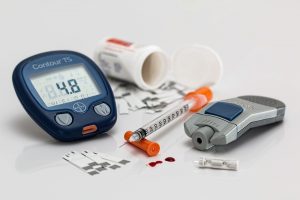 If you’re under stress and have diabetes, you may find it difficult to control your glucose levels. The hormones of stress interfere with it. Stress triggers the fight-or-flight response causing hormone levels to rise and triggering other changes. The body releases both cortisol and adrenaline into the bloodstream. It causes respiration rates to increase and blood to flow to limbs for fighting or running. The adrenaline causes glucose and fats to release to supply energy for the whole body. They flood the blood stream. If your cells can’t convert the glucose into the energy you need, it continues to build in the bloodstream and glucose levels rise.
If you’re under stress and have diabetes, you may find it difficult to control your glucose levels. The hormones of stress interfere with it. Stress triggers the fight-or-flight response causing hormone levels to rise and triggering other changes. The body releases both cortisol and adrenaline into the bloodstream. It causes respiration rates to increase and blood to flow to limbs for fighting or running. The adrenaline causes glucose and fats to release to supply energy for the whole body. They flood the blood stream. If your cells can’t convert the glucose into the energy you need, it continues to build in the bloodstream and glucose levels rise.
The type of stress you experience and type of diabetes you have determines the effect stress has.
People with type 2 diabetes will react to stress and stressors differently than those with type 1 diabetes. There’s also a difference in the effect of various types of stress. Is it physical or is it mental? Is it chronic or acute? Mental stress can cause type 2 diabetics to have an increase in blood glucose levels, but people with type 1 diabetes can go either way, either having high blood sugar levels or low blood glucose levels. Physical stress, such as injury, increases blood glucose levels, whether type1 or type 2.
It’s important to keep records and include extra information, particularly when you first discover you’re diabetic.
Tracking your spikes or dips and what you were doing at the time that occurred can help you better understand your body’s response and steps you need to take in the future. If you find you get stressed before a trip or meeting, learn ways to lower your stress levels. You can do that by tracking your blood glucose and events for a few weeks and you’ll see a pattern when it rises. You’ll be able to know when you need to take action to keep your blood sugar under control.
You may have lived with stress for so long, you don’t recognize it.
Stress on your body can be tricky. Sometimes, you’ve lived with it so long, you don’t really notice something is stressful. It helps to know other signs of stress, to more accurately predict what’s bothering you and how to deal with it. Headaches, changes in sleep habits, fatigue, malaise, or muscle pain are physical indications of stress. Lack of motivation, depression, restlessness, anxiety, irritability, changes in eating habits, withdrawal from friends and family, bursts of anger and excess tobacco, drug or alcohol use can be indications. Track those changes, too.
- If you have chronic stress, it’s worse than acute stress, which floods the body with sugar and then is done. Chronic stress slowly makes negative changes in the body and may even be responsible for diabetes in the first place.
- When dealing with stress, fix the stressful things you can fix, avoid the stressful things you can avoid and learn to deal with those you can’t fix or avoid. Exercise, meditation, journaling, outdoor activities, music and spending time with family, friends or pets can help you deal with those things.
- The impact of stress on not only diabetes but the development of diabetes should not be ignored. While stress plays a negative role in most people’s health, it’s worse in diabetics, since it releases glucose into the bloodstream, acting as additional sugar.
- If you’re having trouble controlling your blood sugar, always check with your doctor. There may be a need to change medication or other issue involved. If there’s no other problem, keep a food and stress journal to help find the cause.
For more information, contact us today at A Strong Life

